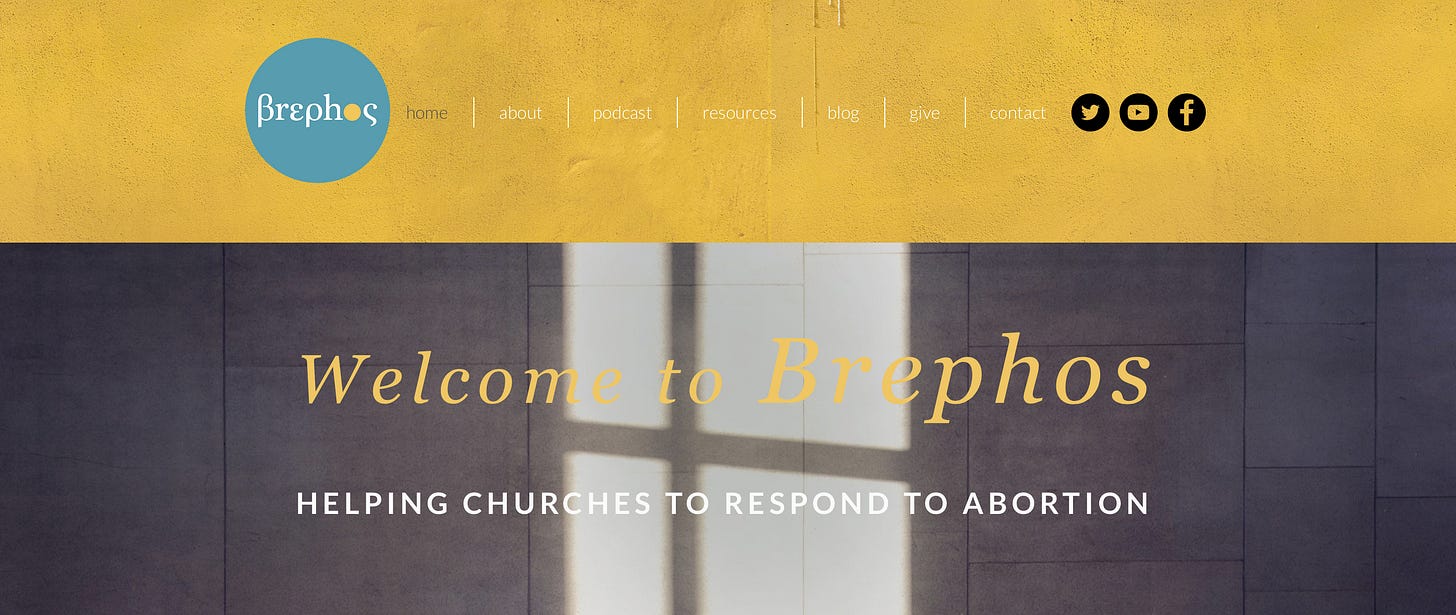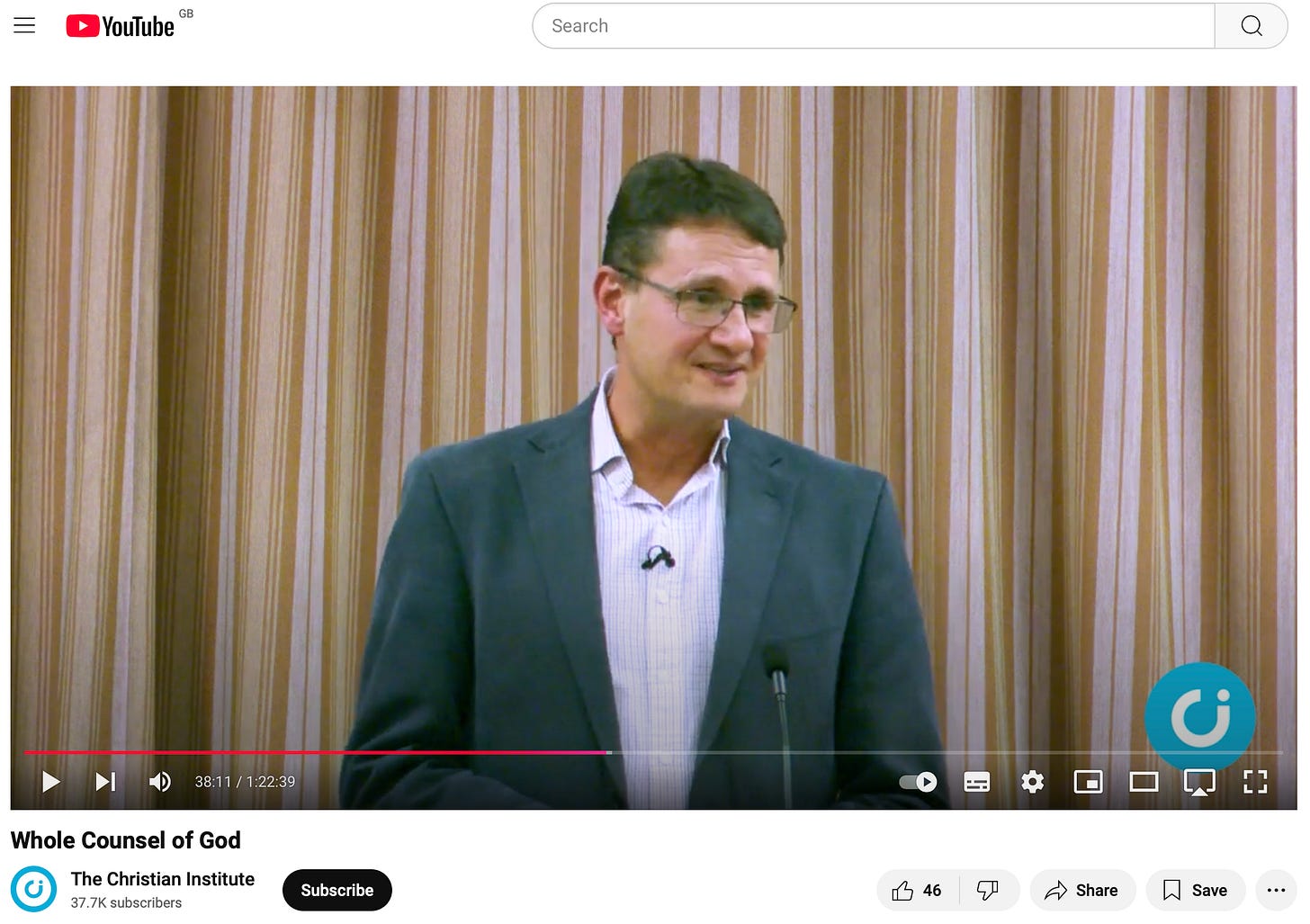Abortion, totalitarianism and evangelism
Brephos, the latest abortion data, the rise of totalitarian government, unexpected evangelistic opportunities, and some recent developments
Dear Church Leaders (and everyone else)
Brephos
It is only recently that I have encountered Brephos, an organisation set up to help churches respond to abortion.
What is Brephos? Here is a 3-minute video introduction (transcript below):
How equipped is your congregation to deal with the crisis of abortion?
For every four babies born alive in the UK, one is killed in the womb. For every two women that never have an abortion in their lifetimes, one does. And for every post-abortive mother there's a post-abortive father as well.
But when’s the last time your congregation heard clear, thorough, biblical teaching on this issue?
Most Christians in the UK today think and behave much like the rest of the world when it comes to abortion. The Word of God has been left by the wayside, and in the fertile soil of the churches… silence. Minds have been moulded by the media to exalt the spirit of the age. We’ve accepted the rhetoric of choice.
But we’re not called to be conformed to the pattern of this world. We’re called to be transformed by the renewing of our minds to discern the will of God.1 And so how do we, who are entrusted with the teaching of God’s Word, direct this? How do we do it well?
Since January 2018, Brephos has been helping churches to do exactly that, many of them for the very first time. To teach about abortion biblically, graciously, effectively. It is possible to do this well.
The name Brephos comes from the New Testament Greek word for “baby”. In Luke Chapter 1 we meet John the Baptist leaping for joy in the womb. He’s described as a brephos, a baby. In Luke Chapter 2 we meet Jesus lying in a manger, a born baby. He’s described as a brephos. And in Luke 18 the children that are brought to Jesus to have them blessed by him… they’re described as brephos too.
So do you see in God’s eyes there’s no distinction? A baby is a baby before birth, after birth, because birth is not when human life begins. It’s a change in location. And our heart is that Christians all over the UK should see the unborn child and abortion as God sees them. And to respond in a way that honours him.
We provide speakers, resources and training. We know how busy life is for church leaders, and we understand the various pastoral concerns that can so easily paralyse us in this area. We’ll do it for you. We’ll do it with you. And we’ll equip you to do it yourself. We’re just eager to get this life-saving teaching to the people of God. The gospel is big enough for this issue.
The various resources that Brephos offers…
…include these Bible studies which are free to download and use:
The flower looks like a forget-me-not, which I guess is not a coincidence.
I have always found these verses from Psalm 139 particularly striking:
13 For you created my inmost being;
you knit me together in my mother’s womb.
14 I praise you because I am fearfully and wonderfully made;
your works are wonderful,
I know that full well.
15 My frame was not hidden from you
when I was made in the secret place,
when I was woven together in the depths of the earth.
16 Your eyes saw my unformed body;
all the days ordained for me were written in your book
before one of them came to be.
The latest abortion data
The number of abortions
I looked up the most recent UK government data on abortion.
There were 251,377 recorded abortions for women resident in England and Wales in 2022 — the highest number since the Abortion Act was introduced and an increase of 17% over the previous year:
Figure 1: number of abortions, England and Wales, 2012 to 2022
The age-standardised abortion rate for 2022 was 20.6 per 1,000 women — the highest since the Abortion Act was introduced. The extent of the rise from 2021 to 2022 is quite striking:
Figure 2: age-standardised abortion rate per 1,000 women aged 15 to 44, England and Wales, 2012 to 2022
Here is the data broken down by age:
Figure 8: crude abortion rate per 1,000 women by single year of age, England and Wales, 2012 to 2022
It appears that in 2022 the crude rate of abortion was substantially higher than in previous years for women aged 19 or over — and especially so for women aged 20-26. But there was little difference compared to previous years for women/girls aged 18 or under.
And here is the data for 2021 and 2022 broken down by wealth:
Figure 17: crude abortion rate per 1,000 women by IMD decile, Wales, 2021 and 2022
While, the crude rate of abortion rose substantially among most groups of women from 2021 to 2022, there was little change among women in the two most deprived groups.
I wonder when the data for 2023 will be published, and what it will show.
I am reminded of this post, one of the first on this Substack:
The reasons for abortion
As to the reasons for abortion in recent times, I did not readily find much information from the UK government. But surveys in the US give at least some idea (NB the red/brown colour indicates an available link to data/more information):
The rise of totalitarian government
The work of Brephos reminds me of something that Rev Dr William Philip2 said in his November 2023 lecture at The Christian Institute. The part that I am thinking of can be found in the section from 38:05 (transcript below):
To set things in context:
If God’s law doesn’t bless our society then other laws will blight our society, won’t they. And the rule of law in our Western world, it’s a legacy, isn’t it, of Christianity. But of course it’s crumbling in the West today in all sorts of areas: marriage, homosexuality, trans, conversion therapy, abortion, euthanasia. There’s a long list...
Now is not the time for quietism and pietism because — well — we’re heading into totalitarianism. Some of you may have read Rod Dreyer’s book [Live Not by Lies],3 and he says we’re already in a world of soft totalitarianism… Peter Adam — who is a very measured, sober, former principal of an Anglican theological college in Australia — he wrote on his blog last month4 a letter in which he said this: “We seem to be heading towards a totalitarian, anti-Christian West. Though it will be equally opposed to anyone who takes more traditional views on these subjects, in the light of their religion, science or common sense.”
So of course… prayer for revival and evangelism… but surely not a holy huddle just while we put our heads in the sand and wait for that to happen.
[Another] problem, I think, related to that, is that we can easily have far too small and individualistic a gospel, which really in a way means a narcissistic gospel. But the gospel is not just about individual faith, is it? It’s the proclamation of the rule of Jesus Christ over every nation. And the world needs to hear that.
And actually it is often that challenge that will provoke people to think and to respond. I call it worldview evangelism. Thinking people around us… they see the chaos in society. They see so much of uh the delusion that’s going on. They’re seeking answers. They’re looking for truth. They’re looking for substance. They’re looking for some sort of coherent explanation of these things. Well, the church has got to be heard saying these things, and in the public arena saying these things.
The silence of the church through all the lockdown and covid business led to a great deal of scorn from society — [scorn] of the church. And I think the capitulation to the state wasn’t just wrong, because I think we have a duty to oppose overreach and tyranny… but I think it was also evangelistically disastrous.
But where Christians were engaged for the truth, there was a great willingness for people to listen. Somebody I got to know — a very intelligent doctor, a pathologist — saw so much of the falsehood in the media, so much of the lies, the censorship, the silencing and marginalising of people who were trying to to show truthful things… In the midst of that [she] saw that there were many Christians also who likewise were arguing for truth and pushing back against tyranny. And that commitment to truth led her to re-evaluate completely her atheism, and in the end to seek more truth. And she found The Truth in the Lord Jesus Christ.
And I have many friends like that. And for several of those, the real thing was not just to be woken up to darkness and lies and so on… evil around in societies. Many people talk like that, and have become [more aware] in a kind of semi-religious way... But people need the Bible and they need the church. And they need churches where the Bible is taught seriously, where it’s applied to life, to society, where it’s critiquing the world — not just a little pietistic huddle.
Unexpected evangelistic opportunities
And now the part re abortion (emphasis added):
But that brings us to another reason which is a problem, and that is that, I’m afraid, there is a great loss of confidence, I think, in the Bible. And especially in parts of the Bible that our culture will reject or resent or that it will rage at if we speak about it.
But the Bible speaks to the world as well as to the church. And the church, we’re told, is to be a pillar and a buttress of truth in society — to uphold the truth to defend it in both what it demonstrates, but also in what it declares, because we’ve got the better story that everybody needs. That’s what Deuteronomy 4 is about. It’s saying that the world must hear the wisdom and the understanding contained in God's instruction for life. We often avoid tough things because we think that it’ll put people off. But in doing that we may be denying people the very thing that they need to hear, and in fact [that] they’re looking for.
Take abortion for example. Over the last couple of years, we have started to have a team that goes out on the streets and does displays about abortion, and educates about abortion. And, yes, they face a lot of abuse and rage and so on, but they have had many, many real conversations and some conversions. Somebody professed faith in our church last night who first came through conversations on the street about abortion. And the reason for that is that immediately they’re dealing with serious matters of life and death: What does it mean to be human? Why does it matter? Can this beautiful thing — a baby embryo — really be by chance? All of these sorts of things. There’s real engagement with real issues.
Now that is very different, isn’t it, from nice but rather superficial chats with a friend who comes along to a church evangelistic event because you’re putting on the World Cup rugby matches. And they might have come several times, but they’ve never got into the church, they’ve never got into the Bible, they’ve never got anything further than just talking about the rugby with some Christians.
We’ve now decided in our church to cut out wherever we can what we call evangelism delusion. Because many of the things that our churches are putting on are simply deluding ourselves to help us think that we’re doing lots of active evangelism, but actually we’re not really getting into the heart of issues at all.
And… in my experience, it’s not the non-Christian who’s not really interested in the Bible’s actual message. It’s the Christians who don’t have the confidence to believe that this message really has the answers that the non-Christian friends need. Whenever I hear somebody saying, “Oh, I think if I was a non-Christian I’d find this very difficult” or “I think if I was a non-Christian, I wouldn’t understand that”… nearly always when a phrase is begun with “If I was a non-Christian…” what they’re about to say next is totally wrong… totally wrong, if I go by all the non-Christians that I speak to.
Some recent developments
To anyone thinking along the lines of “Totalitarianism? In the UK? Don’t be ridiculous!” I would point to (among other things) the case of Adam Smith-Connor:
An army veteran has today been convicted for praying silently near an abortion clinic.
Adam Smith-Connor, who served in Afghanistan, was prosecuted for breaching a ban on protests within a buffer zone around a clinic in Bournemouth, Dorset, in November 2022. His head was bowed and hands were clasped as he prayed for his unborn son Jacob, whom he now regrets aborting more than two decades ago.
Reporting on the case, the Alliance Defending Freedom (ADF) legal advocacy group said the conviction was “the first known conviction of a ‘thoughtcrime’ in modern British history.”
It added that Smith-Connor must now pay £9,000 (€10,770) in legal costs to the prosecution, just for praying in his head for three minutes.
For some recent broader context, see this two-minute clip (transcript below):
I’m stood 150 m away from Big Ben, which is the same distance in which the government has enforced a buffer zone around every abortion facility across England and Wales. It will now be illegal to influence anybody’s decision to access abortion services within 150 metres of the building.
Now we all stand against harassment of women anywhere. Unfortunately the word “influence” is so broad and elastic that it could apply even to consensual conversations, offers of help, or possibly even prayers offered in those public streets. Where we’ve seen buffer zones implemented in local areas already, ADF UK have supported the defence of four people who’ve been prosecuted only for praying simply in their heads, or for offering a consensual conversation.
In Bournemouth, Adam Smith-Connor, only two weeks ago, was convicted, found guilty of a crime for silently praying for three minutes near an abortion facility. In Birmingham we saw two similar cases, and back in Bournemouth next year we’ll be seeing Livia Tossici-Bolt head to trial only for holding a sign saying “here to talk, if you want”.
In the United Kingdom, freedom of thought and freedom of speech is protected both in domestic and international law. We should not be prosecuting people for their thoughts. We should not be withholding the rights of women to engage in consensual conversations about offers of help and services available to them, that they may wish to learn about when facing a crisis pregnancy. It’s really important that we protect freedom of speech and freedom of thought at this crucial moment in time.
ADF UK are working to defend those in court who are being prosecuted, and to stand up against censorship. Please find out more about what we’re doing at ADF UK. We’re so thankful for your support.
Related (on the subject of totalitarianism):
Dear Church Leaders Archive; some posts can also be found on Unexpected Turns
The Big Reveal: Christianity carefully considered
This address was given in November 2023






















